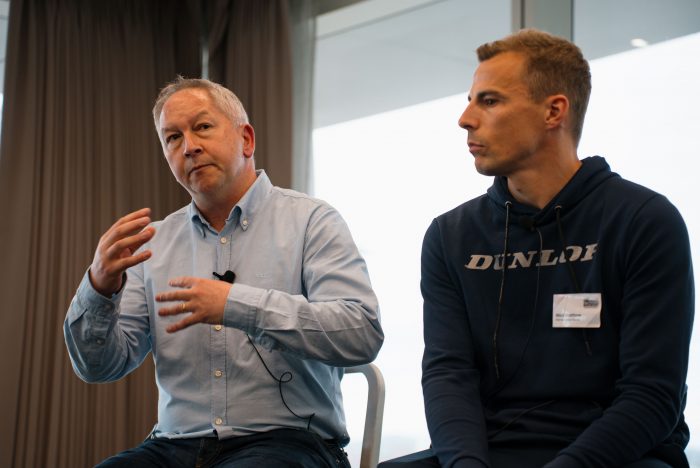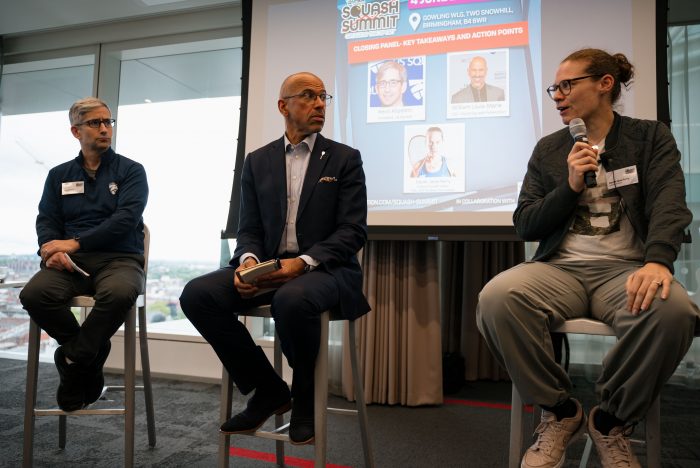The PSA Squash Summit, meticulously orchestrated by Adriana Olaya, Head of the PSA Foundation, marked the beginning of a new collaborative era for our sport. No longer are we reminiscing about missed opportunities; instead, we are celebrating a significant leap forward underpinned by the news of our Olympic inclusion. The summit wasn’t just a gathering — it was a testament to the unity and ambition propelling squash into a bright new era.
 From the outset, the summit was imbued with a sense of purpose and celebration. Adriana’s leadership was met with heartfelt tributes, her efforts inspiring a deep sense of gratitude and hope among all attendees.
From the outset, the summit was imbued with a sense of purpose and celebration. Adriana’s leadership was met with heartfelt tributes, her efforts inspiring a deep sense of gratitude and hope among all attendees.
Alex Gough, CEO of the PSA, alongside Chief Commercial Officer Tommy Berden, delivered insightful presentations on the PSA’s success, detailing the organisation’s commercial achievements and strategic innovations. Their discussions painted a picture of a sport on the rise, illuminating the path forward and showcasing how the PSA’s vision is transforming the landscape of squash.
The mood of the summit was buoyant, with squash’s inclusion in the LA 2028 Olympics being a constant source of hope and optimism. This milestone is more than just a victory for professional players; it’s a collective triumph for the entire squash community. US Squash’s CEO, Kevin Klipstein’s insights into this achievement underscored its strategic importance, marking it as a pivotal opportunity for global growth and recognition.
Engaging Gen-Z emerged as a crucial theme throughout the summit. In a world dominated by rapid media consumption, the question of how to captivate younger audiences was at the forefront. I see an opportunity to leverage fitness influencers to promote the concept of being “squash fit” ahead of the Olympics, showcasing our athletes as some of the greatest on the planet.
Despite the unfair criticisms often levelled at squash online, the summit highlighted the sport’s advancements, particularly in innovation and technology. The PSA’s direct consumer model through Squash TV is a testament to squash’s ability to compete in a crowded digital landscape. This model not only showcases the sport’s elite athleticism but also engages a broader audience, solidifying squash’s position as a forward-thinking and dynamic sport. The challenge for squash is to understand how we reach a broader audience and reach new fans when it becomes harder to showcase what we have via traditional broadcast methods.
Technological advancements were a major focus, with panels discussing AI refereeing, universal squash ratings, and data-driven insights from Sports Data Labs. Platforms like SquashSkills and SquashLevels are revolutionising how players improve and measure their performance, while InteractiveSQUASH is creating engaging and immersive experiences for both players and spectators. Embracing these innovations is crucial for the sport’s evolution, ensuring that squash remains relevant and engaging for future generations.
 The panel focused on outdoor courts and choosing the right ball created plenty of discussion. Mike Harris’ fervent endorsement of the new prototype Dunlop ball reverberated throughout the room, buoyed by anecdotes from those immersed in junior development, extolling its virtues. Steve Heatley, flanked by Nick Matthew echoed this sentiment, championing the notion of a slightly larger, bouncier ball that obviates the need for pre-match warm-ups. Consensus gradually coalesced around the idea of introducing such a ball for both younger and older demographics, challenging the entrenched use of the double yellow dot, particularly among novices and seniors. While debates also touched on game modifications such as higher tins, the prevailing energy in the room leaned towards exploring alternative ball options, with the promising new prototype sparking optimism for potential innovations within the sport.
The panel focused on outdoor courts and choosing the right ball created plenty of discussion. Mike Harris’ fervent endorsement of the new prototype Dunlop ball reverberated throughout the room, buoyed by anecdotes from those immersed in junior development, extolling its virtues. Steve Heatley, flanked by Nick Matthew echoed this sentiment, championing the notion of a slightly larger, bouncier ball that obviates the need for pre-match warm-ups. Consensus gradually coalesced around the idea of introducing such a ball for both younger and older demographics, challenging the entrenched use of the double yellow dot, particularly among novices and seniors. While debates also touched on game modifications such as higher tins, the prevailing energy in the room leaned towards exploring alternative ball options, with the promising new prototype sparking optimism for potential innovations within the sport.
The summit also addressed the challenges facing squash in England, contrasting them with the thriving scene in the US. The need for revitalisation in England was emphasised, highlighting the importance of strategic initiatives to boost participation and ensure that squash remains vibrant in its traditional heartland.
Rob Owen’s session was entertaining and engaging, with media engagement emerging as a hot topic. The importance of generating positive headlines was underscored. In an age driven by clicks, it’s crucial for the squash community to champion its successes and create a narrative that attracts and inspires.
Grassroots initiatives and the Squash for Development organisations were among the most heartwarming aspects of the summit. Stories from the Nicol David Organisation and Michael Hill’s Rackets Cubed demonstrated how squash can transform lives. These initiatives, focused on supporting disadvantaged youth, showcased the sport’s profound social impact, often moving attendees to tears.
Breakout sessions provided valuable insights into making squash commercially viable. Discussions on best management practices and the profitability of well-managed courts were enlightening. Innovations like interactive squash and kid-friendly events were proposed as key strategies to attract new participants and ensure financial sustainability.
The potential for integrating squash with other racket sports like padel and pickleball was also explored. This inclusive, multi-sport approach promises to bring new audiences into the squash fold, enriching the overall ecosystem of racket sports.
 As the summit drew to a close, the final panel with Kevin Klipstein, William-Louis Marie (CEO of World Squash), and Sarah-Jane Perry (former Wold number five) encapsulated the event’s spirit. The message was clear: this summit is the beginning of a new chapter. With collective drive and strategic vision, the squash community is poised to leverage the historic moment when we join the Olympic family, drawing new players and fans to the sport.
As the summit drew to a close, the final panel with Kevin Klipstein, William-Louis Marie (CEO of World Squash), and Sarah-Jane Perry (former Wold number five) encapsulated the event’s spirit. The message was clear: this summit is the beginning of a new chapter. With collective drive and strategic vision, the squash community is poised to leverage the historic moment when we join the Olympic family, drawing new players and fans to the sport.
The PSA Foundation’s Squash Summit was a great event, celebrating unity, innovation, and growth. As the squash community moves forward, buoyed by the summit’s energy and insights, there is a shared sense of purpose and optimism. This is not the destination but the beginning of the journey.
The sport must work hard collectively to ensure that LA 2028 is not a flash in the pan. We have to strive for Olympic inclusion in Brisbane in 2032, with the decision to be made in late 2027, a year before we showcase what we have in LA. The hard work starts now.
Collaboration is key, and this was a magnificent beginning. Together, we will seize this moment and propel squash to new heights, making it a sport that not only thrives but inspires and unites people worldwide.
Jethro Binns
Sign up to the SquashSkills newsletter
Get world class coaching tips, straight to your inbox!